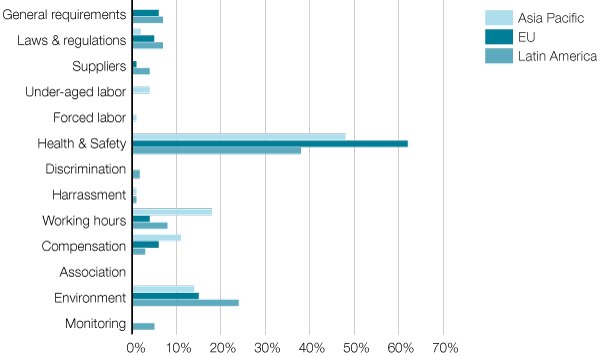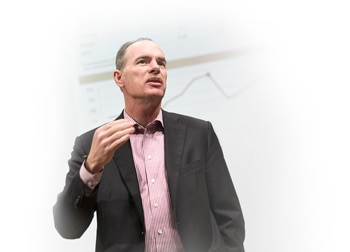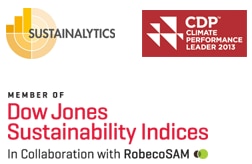Procurement practices
HR1-3
The Group’s standard supplier business contract requires that each supplier acknowledges and promises to fulfill the Electrolux Code of Conduct.
Electrolux has over 3,000 suppliers and they are all expected to live up to the Group’s high standards for environment, labor and human rights. As part of its Responsible Sourcing Program, Electrolux carries out audits to check that these suppliers’ practices are aligned with the CoC.
The proportion of procurement from low-cost regions increased from 30% in 2004 to approximately 65% (60) in 2013 and is expected to reach approximately 70% by 2015.
Acquisitions--considered significant investment agreements--are screened for their sustainability risk as part of due diligence. These risks include human rights. Significant efforts are made to align these new operations to Group human rights, labor and environmental standards. No major acquisitions were made during 2013.
Human rights screening among suppliers
In total, 376 (293) audits were performed among suppliers this year, 328 (263) by Group sustainability auditors and 48 (30) by third-party assurers. A total of 46 (55) findings of a 'zero tolerance' nature were found, which led to further cooperation to implement immediate improvements. Special consideration was made to the growing supplier base in the Ukraine, Egypt, Chile and Argentina.
In total, the number of audits increased by 28%, or 83 more than last year. The average number of findings per audit is relatively constant year-on-year due to a changing supplier base. This indicates a need for hands-on engagement to address violations, particularly in new regions. The number of zero-tolerance findings has been reduced slightly.
Health and safety issues continue to be the area with the greatest number of non-compliances, followed by environmental non-compliances.
HR1-3, Audit findings

The improvement ratio between initial and follow-up audits rose compared to last year. Follow-up audits that were carried out at 87 (53) suppliers indicate considerable improvement by most, particularly in Latin America and Europe. Outstanding issues are either minor or require long-term changes in their procedures to accomplish sustainable improvements. Complimentary activities such as training and practical advisory services are necessary to support further improvements among these suppliers.
HR1-3: Follow Up Audits

Training and awareness raising
The Responsible Sourcing Program has been a forerunner in applying a ‘beyond monitoring’ approach, by providing supplier training through the Workplace Standard and by developing projects and training for specific, strategic suppliers.
During 2013, supplier training was carried out in all regions deemed high risk, with the aim of raising awareness and knowledge of the importance of high sustainability standards, particularly focusing on the Group’s requirements and the Responsible Sourcing strategy. A total of 127 suppliers--representing 13% of high-risk suppliers--were trained during the year.
In addition, Electrolux employees in key positions in procurement have received between two and eight hours of dedicated training on policies and procedures concerning compliance to the CoC. Employees within quality, logistics, product management and sales were also targeted.
Challenges with an expanding supplier base
New challenges are emerging with a growing supplier base in the Ukraine, Egypt, Chile and Argentina
In Egypt, focus is on meeting Group expectations regarding environmental standards and working hours where Electrolux requirements exceed local minimum legal requirements. Additionally, the existence of migrant workers requires particular attention to work permits, contract issues and language barriers. The current political situation poses challenges regarding obtaining needed permits and licenses
Audits indicate rapid improvements however. Greater emphasis on human rights is demonstrated by fewer findings relating to harassment and discrimination. Improvements in safety standards are also visible.
In the Ukraine, the lack of enforcement of national legislation is an issue and inaccurate worker payment records are recurring themes. Preparedness for fire emergencies is generally low and management of chemicals and waste remains a challenge in terms of storage, labeling and handling.
In Chile and Argentina a systematic CoC approach is still in its infancy in this industry—the number of audit findings have been between 50 and 100% higher than in corresponding audits in Brazil. Findings are mainly related to environmental-, health and safety management, working hours and working conditions. Continuous supplier dialogue, development and training will be key activities for improving awareness of Code of Conduct issues.
Strengthening the chain in Egypt.
Throughout the wave of political instability that swept Egypt in 2013, business had an important role to play in providing stable working environments and jobs. In Egypt, Electrolux is raising awareness upstream of the value of high environmental, labor and human rights standards.
CEO Statement

In 2013 we continued to deliver above our growth target and delivered 4.5% in organic sales growth.
CEO Statement

I'm convinced that raising product efficiency for the growing middle class is where long-term shareholder value creation lies.
Our products

Electrolux is the only appliance manufacturer in the industry to offer complete solutions for both consumers and professionals. The focus is on innovative and energy-efficient products in the premium segments.
Sustainability
Achieving the Group's vision of sustainability leadership is crucial to realizing the business strategy. The objective is to develop smarter, more accessible, resource-efficient solutions that meet people's needs and improve their lives. Read the comprehensive sustainability performance review.
Awards & recognition

Financial Reporting
Net sales for the Electrolux Group in 2013 amounted to SEK 109,151m, as against SEK 109,994m in the previous year. The organic sales growth was 4.5%, while currencies had an impact of -5.3%.
